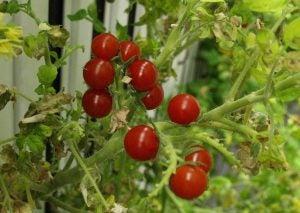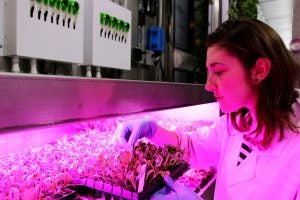The technology and innovation moving within modern day agriculture is so fast-paced and expansive, you can find futuristic solutions, ideas, and research sprouting in some pretty unlikely places. Among the most unsuspecting would be full-scale commercial farming and research happening inside what looks like a shipping container.
Enter Freight Farms, a company founded in 2010 and known for their hydroponic vertical container farms used to grow a variety of fresh crops virtually anywhere in the world. Recently, Freight Farms’ technology was used by Cold Spring Harbor Laboratory to explore the integration of CRISPR tomato seed genetics in a climate-controlled vertical farm setting. The trials were conducted by Dr. Zach Lippman, who is engineering a wider variety of tomato crops capable of being grown successfully and commercially in the Freight Farms-style vertical systems.
“This was an exciting experiment for us to help prove where containerized vertical farming and CRISPR seed genetics can work together to create commercial opportunity for a new class of seeds and crop development,” says Jon Friedman, co-founder of Freight Farms and company COO. “In alignment with our mission, the study opens the door to new efficient methods of food production that people can use right in their own communities — regardless of spacial limitations or land access — to increase the breadth of food access, all while reducing carbon footprint and keeping pesticides and herbicides out of the equation.”
Using the container’s environmental controls, the research was able to fully capitalize on the unique characteristics of the gene-edited tomato seeds by creating optimal growing conditions not available in any natural setting. The end result was a new crop structure of small, compactly bunched tomatoes ready for harvest in less than 40 days. Unlike traditional tomato varieties, the one developed by the Cold Spring Harbor Laboratory directs most of the plant’s energy into making and ripening fruit instead of inefficient growth spent on vine structure.

The success of the trials proves hopeful for the vertical farming on the commercial level, allowing for more uncommon varieties to be available to the mainstream, eliminating long distance transportation and variables in the elements.
Friedman says their technology could also elevate the quality of produce in ways that can’t be currently done due to the obstacles of travel, climate and environmental issues. Hydroponic vertical farming is one of many solutions to make global food production more sustainable, simplifying the supply chain and ensuring access to healthy, local food even in areas without easy access to typical agriculture resources and arable land.

While exciting, there is more research to be done in Freight Farms’ future. In 2019, the company launched Greenery, a container farm that succeeded the company’s flagship Leafy Green Machine. The company’s IoT data platform known as farmhand is fully integrated into all Greenery operations and is intended to be a scalable, accessible solution that allows people anywhere in the world to grow more than 500 varieties of pesticide-free produce with 99.8 percent less water than conventional agriculture. Inspired by Freight Farms’ innovations, French food-service company Sodexo reached out to form a national partnership with Freight Farms in order to accelerate implementation of the farms onto educational and corporate campuses across the U.S.
All the while, Freight Farms has continued to expand its team and leadership, and its customers currently span 44 U.S. states and 25 countries.
“To date, we’ve been an integral part of scientific and academic research studies in collaboration with industry-leading organizations like NASA to explore self-sustaining crop production, grow food in extreme climates, and develop new applications for our products to expand the potential of agricultural technologies,” Freidman says. “Our proprietary data can be applied across controlled environment agriculture, and we’ll continually look for ways to both advance industry development, and find ways it can converge in meaningful ways across sectors.”
Jaclyn Krymowski is a graduate of The Ohio State University with a major in animal industries and minor in agriculture communications. She is an enthusiastic agvocate, professional freelance writer, and blogs at the-herdbook.com.



